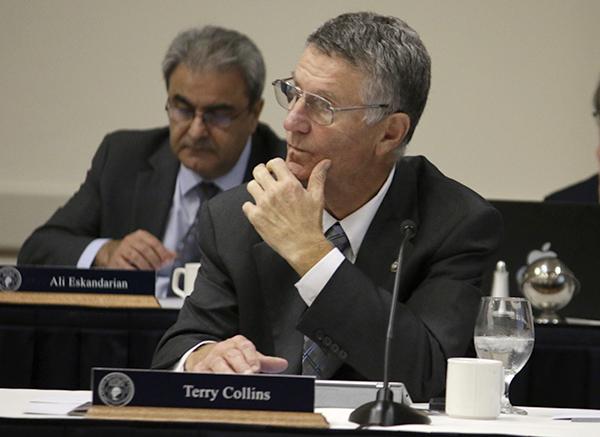A trustee who was the first in his family to attend college is creating a scholarship for eight engineering students who otherwise wouldn’t be able to enroll at GW.
Terry Collins, who took night classes at GW to earn his doctorate in electrical engineering, said his tuition at the Massachusetts Institute of Technology would have made up 80 percent of his family’s yearly income without a scholarship.
Now he and his wife are donating $1.5 million to fund a School of Engineering and Applied Sciences scholarship, which will give preference to first-generation students. They donated another $1 million to create an endowed professorship in the school’s new biomedical engineering department.
“I just wanted to give back so that maybe another student could succeed like I did,” said Collins, whose father was the only other member of his family to graduate from high school.
Collins has a long history with the University: After graduating in 1976, he taught part-time at SEAS until 1979. He is also a member of the school’s National Advisory Council, the board that helps advise the dean on major decisions for the school, and was voted onto the Board of Trustees last year.
Collins is a vice president at Boeing, overseeing the company’s electronic and mission systems division. But he said for someone with his background, that level of success is rare.
“Statistics show they have a harder time getting through actually graduating, so I wanted to focus on that area,” he said, adding that he and his wife, Alisann, were determining how to divide their estate and wanted to help give students the opportunity to succeed.
About 17 percent of applicants to GW last year came from families in which neither parent had earned a bachelor’s degree. A 2011 survey from the University of California Los Angeles reported that five percent of GW students were first generation.
Nationally, about 89 percent of first-generation students leave four-year colleges after six years without finishing a degree.
The University tested a pilot program that matched first-generation students with mentors last fall in an effort to support those students who are among some of the most at risk for dropping out or transferring.
Collins said he and his wife chose to give $1 million to establish an endowed professorship in biomedical engineering because Dean David Dolling said the new department needed a boost.
“I think he’s got a very good strategy on how to improve the engineering department, so I’m trying to help implement that,” he said. “We have been giving, but not on this sort of scale.”
The department officially launched this fall, and the school hopes it will have a founding chair by this spring. It has five full-time faculty members, with four secondary and five affiliated professors teaching the 231 students.
Board of Trustees Chair Nelson Carbonell said large donations from Board members like Collins help set an example for other trustees to contribute to the University’s $1 billion fundraising campaign.
“That’s an important message to send not only for other donors and foundations that are looking to support our work, that the Board is behind the institution philanthropically,” he said.
Avram “Ave” Tucker, another trustee, donated $2 million last week to the University’s athletics department, the GW School of Business and the GW Law School. Barcroft Park, where GW’s baseball team plays in Virginia, was renamed Tucker Field after the former GW baseball player.
Mark Shenkman made a donation of $5 million to GW’s business school and career services center in the spring, the largest-ever gift from a sitting member of the board. Ivory Tower was renamed Shenkman Hall in his honor.
SEAS hopes to raise $50 million as part of the University-wide $1 billion campaign, with $30 million set aside for student scholarships and faculty support.
Chloe Sorvino contributed reporting.








